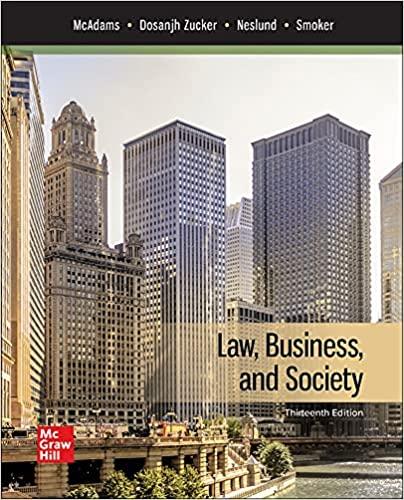A group of former collegiate athletes in football and basketball (mens and womens) sued the National Collegiate
Question:
A group of former collegiate athletes in football and basketball (men’s and women’s) sued the National Collegiate Athletic Association (NCAA) claiming that NCAA rules limiting financial aid constitute an agreement among competitors that restrains trade in violation of federal antitrust laws. The athletes sought to end or modify those financial aid caps, while the NCAA argued that maintenance of amateurism principles is essential to the health of its sports and the loyalty of its fans. The athletes won at least a partial victory at the federal district court level in 2019 with the court ruling that colleges and conferences can expand aid to athletes beyond the “cost of attendance” to include all expenditures necessary for educational purposes, such as graduate school scholarships, computers, science equipment, and musical instruments. The NCAA can, however, continue to limit all compensation that is unrelated to education. Thus, the athletes were denied the free market they were seeking, and the NCAA was able to maintain its core interest in treating athletes as amateurs rather than paid employees. At this writing, the NCAA has appealed the district court decision.
Questions
1. Do you think the NCAA restraints on compensation for athletes constitute an ethical wrong? Explain.
2. Have present and former NCAA athletes, such as Ed O’Bannon, been unfairly and wrongfully denied a bigger share of the income they help generate in order to preserve amateurism? Explain.
3. Should college athletes be free to “sell” their services to the highest bidder among America’s colleges and universities? Explain.
4. Joseph Agnew and Patrick Courtney earned college football scholarships but were injured early in their college careers. Consistent with NCAA rules, both players had received oneyear scholarships with the possibility of renewal. Neither Agnew nor Courtney received scholarship renewals following their injuries. Both players sued the NCAA claiming its rules forbidding multiyear scholarships and imposing caps on the number of scholarships given per team prevented them from securing scholarships that would have covered their full college experience.
a. Explain why the two plaintiffs thought they had been wronged by the NCAA rules.
b. Do you agree with the two plaintiffs? Explain. See Agnew v. National Collegiate Athletic Association, 683 F.3d 328 (7th Cir. 2012).
Step by Step Answer:

Law Business And Society
ISBN: 9781260247794
13th Edition
Authors: Tony McAdams, Kiren Dosanjh Zucker, Kristofer Neslund, Kari Smoker





